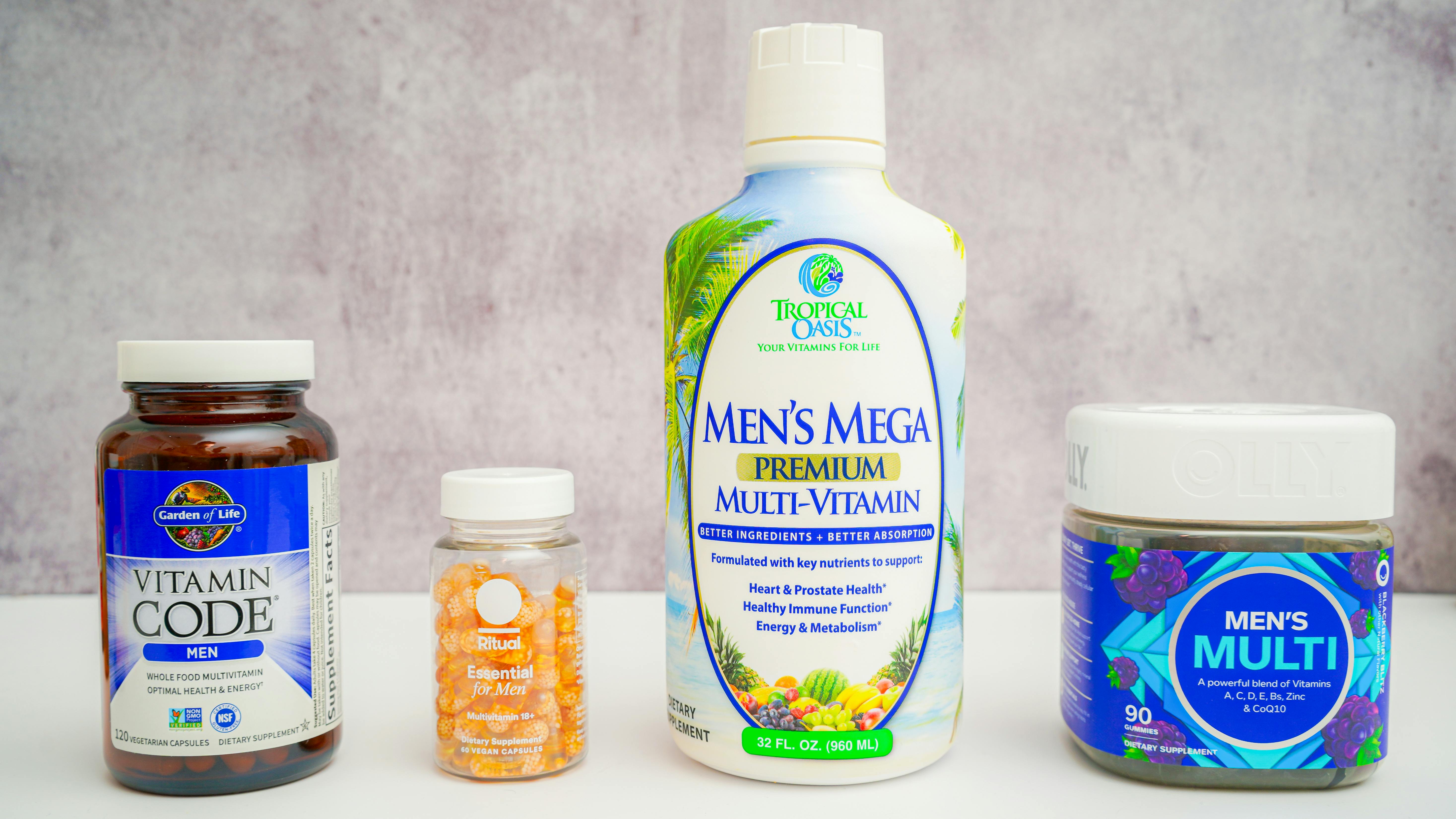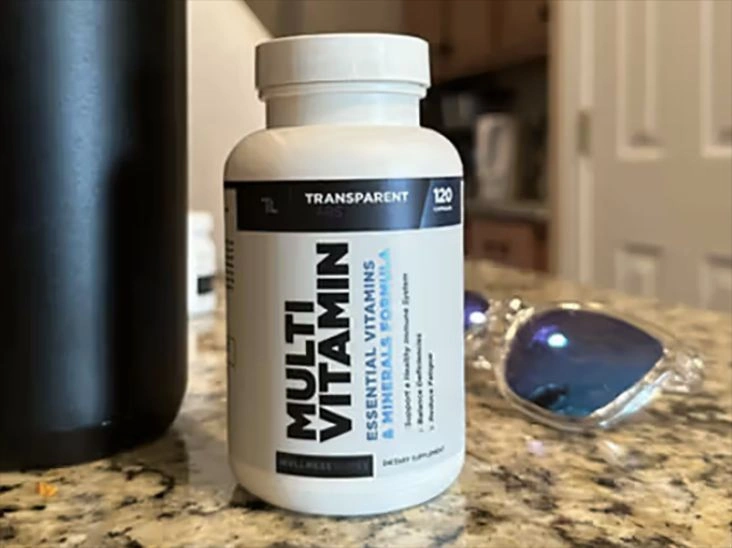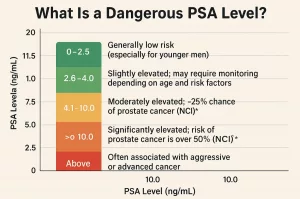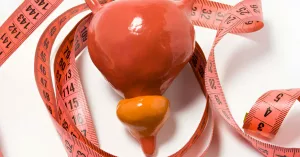A quick look at the best multivitamins for men
- Best overall: | Skip to review
- If you already get a lot of nutrients through food: | Skip to review
- Beneficial if you’re over 40: | Skip to review
- Pricier but may benefit prostate health: | Skip to review
- An impressive gummy option: | Skip to review
(Note: Sex and gender exist on spectrums. This article uses “men” to refer to a person’s sex assigned at birth.)
What defines a quality men’s multivitamin?
We revisited the top multivitamins for men with input from registered dietitian Kelli McGrane.
With so many flashy brands pushing products on social platforms, we wanted to answer a core question: What actually makes a men’s multivitamin worthwhile?
A multivitamin won’t perform miracles. Depending on how balanced your diet already is, you might notice quicker effects like better energy. For many people, though, a multivitamin functions as a long-term strategy to support overall wellness.
Our team reviewed more than 100 products to identify the best multivitamin for men. We personally tried over 20, consulted experts, and scrutinized ingredient lists. Below are the top choices we recommend for most men.
Disclaimer: Some products included here were provided to us at no cost. Our conclusions are independent and have not been reviewed, approved, or endorsed by the product makers.
Healthline’s picks of the best multivitamins for men
A comparison of the best multivitamins for men
Vitamin AB6B12Vitamin EVitamin KSeleniumVitamin DCalciumMagnesium
83% DV 235% DV 750% DV 150% DV 67% DV 127% DV 125% DV 12% DV — 20% DV — 333% DV 45% DV 75% DV — 250% DV — 7% DV 58% DV 353% DV 500% DV 133% DV 75% DV 91% DV 125% DV — — 125% DV 612% DV 10,417% DV 223% DV 42% DV 182% DV 63% DV 8% DV 24% DV 30% DV 100% DV 167% DV 60% DV 43% DV 25% DV 200% DV — —
Other multivitamins for men that we tested and evaluated
- is another solid multivitamin that can help fill nutritional gaps. It’s made with whole-food–based components rather than synthetic isolates, including organic Brussels sprouts and organic ginger. This supplement used to be our top choice, but we ultimately found Nature Made to be the better overall value. If organic, non-synthetic ingredients matter to you, this remains a strong option.
- is a very thorough and potent multivitamin for people with larger nutrient shortfalls. It’s among our top selections for women, too. However, it contains iron—a mineral men generally need about half as much of compared with women. McGrane cautions that excess iron can cause digestive upset and, in some cases, more severe issues like liver damage. She advises choosing an iron-free formula unless a clinician recommends otherwise (or dietary intake is insufficient).
- meets many nutrient needs, though our Nature Made best-overall pick was slightly more complete and less costly. This supplement does provide a much higher B12 dose. If B12 is a main concern, Nutricost might be appropriate. Our Pure Encapsulations choice above delivers even more B12 but also contains a larger vitamin E dose, which isn’t ideal for everyone.
- is missing some vitamins found in other multis, such as folate and riboflavin. Still, it’s fairly comprehensive and a reasonable option overall. Its primary drawback is the need to take four capsules daily. It also includes ashwagandha, which could be a benefit for some but may interact with certain prescription drugs.
How we selected the best multivitamins for men

We narrowed our list of top multivitamins for men using guidance from registered dietitians Kelli McGrane, MS, RD, and Ellen Landes MS, RDN, CPT. We examined ingredient quality, the spectrum of nutrients provided, third-party testing, and cost.
Every product featured here passed a thorough review by our vetting team. We evaluated each option based on:
- Nutrient quality: We favored products that use well-absorbed nutrient forms, while acknowledging that some less-absorbable forms can suffice if deficiencies aren’t present.
- Percentage of the DV: It’s acceptable for a multivitamin to supply under 100% of the DV for certain nutrients, especially if you obtain them regularly from food. But if you have documented deficiencies, choose a formula with higher amounts for those specific nutrients.
- Simplicity: We prioritized products without artificial additives.
- Certifications and quality: We look for seals from groups like USP and NSF, which indicate third-party testing for quality, purity, and accurate labeling.
- Brand reputation: The multivitamins we recommend are made by medically credible companies and adhere to Food and Drug Administration (FDA) labeling requirements.
- Vetting: All included multivitamins were vetted to ensure they meet Healthline’s standards for integrity and health information. You can read more about our vetting approach.
Why Trust Healthline
100+ multivitamins evaluated • 55+ multivitamin brands reviewed • 20+ multivitamins personally tested
How we evaluate multivitamins
Our Medical Standards and Insights team has researched and vetted more than 11,000 products and services. We fact-check health claims, analyze ingredients, and assess each brand’s reputation before recommending products on Healthline.
To compile the selections on this page, we started with products that passed our vetting process and then personally tested several to refine our recommendations.
Which vitamins should men take daily?
When picking a multivitamin, check which nutrients it provides.
Micronutrient needs vary widely by age, sex, health conditions, and medications.
Still, adult men commonly need to ensure adequate intake of the following:
- Vitamin A: important for skin, vision, and immune function
- B vitamins: key for energy production and red blood cell formation
- Vitamin C: necessary for immune support and collagen synthesis
- Vitamin D: crucial for bone, dental, immune, and overall health
- Calcium, magnesium, and vitamin K: important for bone integrity
- Vitamin E and selenium: act as antioxidants to help shield cells from damage
- Magnesium and potassium: help regulate blood pressure, heart and muscle contraction, and support cardiovascular function
As men grow older, absorbing vitamin B12 can become more difficult, so supplementation might be necessary.
Who might benefit from a multivitamin?
Not everyone needs a multivitamin, but if your diet doesn’t meet your nutrient needs, a multivitamin can help.
Men who might benefit include those with:
- restrictive diets
- absorption challenges
- limited access to nutrient-rich foods
Also, certain nutrients—like B12 and D—are harder to obtain as you age.
If you already take multiple supplements, use protein powders, or consume many fortified foods, adding a multivitamin could push you into excessive intake for some nutrients.
It’s a good idea to consult a healthcare provider about whether a multivitamin is appropriate; they may suggest a single-nutrient supplement instead.
Prostate health
Some men’s multivitamins include vitamins, minerals, herbs, or antioxidants that may support prostate health.
Saw palmetto and beta-sitosterol are frequently added to men’s supplements.
These ingredients may help support prostate health and ease urinary symptoms related to benign prostatic hyperplasia (enlargement of the prostate), though more research is needed.
While certain nutrients and plant compounds could be helpful for prostate health, high doses of vitamin E might have harmful effects.
Some herbs and nutrients may be unsuitable for certain people or interact with medications. Always consult a healthcare professional before introducing a new supplement.
A note on vitamin E supplements for prostate healthResearch is still evolving, but some studies suggest that high-dose supplemental vitamin E may raise prostate cancer risk in otherwise healthy men.
Because of this, it’s prudent to avoid products containing large amounts of vitamin E unless a qualified healthcare professional specifically recommends them.
If you’re uncertain about vitamin E supplements, speak with a clinician such as a doctor or dietitian for guidance.
Frequently asked questions about daily multivitamins for men
Should men take a daily multivitamin?
Research on multivitamin benefits is mixed, though they’re unlikely to harm healthy individuals.
A physician might recommend a single vitamin instead of a multivitamin if the multivitamin includes nutrients you don’t require.
Remember, multivitamins aren’t substitutes for a nutritious diet, and not everyone needs one.
Which vitamins should men take daily?
Adults need 13 essential vitamins and seven primary minerals from their diets. For men, key nutrients often include calcium, magnesium, selenium, all eight B vitamins, and vitamins A, C, D, and K.
Depending on your food choices, you may be able to meet these needs through diet alone.
How do men’s and women’s multivitamins differ?
Men’s and women’s multivitamins usually vary in the amounts and types of nutrients they contain.
For instance, men’s formulas may include higher selenium to support sperm health, while women’s formulas often have more iron to account for menstrual losses.
When should you take a multivitamin?
There’s no universally best time to take a multivitamin. Because fat-soluble vitamins absorb better with meals containing fat, taking your multivitamin with food is a sensible approach.
The bottom line
It’s possible—and ideal—to meet nutrient needs through a balanced diet, but some people fall short.
With many quality multivitamins available, you can likely find one that fits your needs.
Always discuss adding supplements with a healthcare professional, such as your primary care physician or a registered dietitian, especially if you use prescription or over-the-counter medications.

























Leave a Reply
You must be logged in to post a comment.